 'Model husband' shatters image of love
'Model husband' shatters image of love
 Can animals smile? Or put on a happy face
Can animals smile? Or put on a happy face
 Geng Xuan crowned at 9th China Super Model Contest
Geng Xuan crowned at 9th China Super Model Contest
 Top 10 billionaires in the liquor industry
Top 10 billionaires in the liquor industry
 Backstage at China Fashion Week
Backstage at China Fashion Week
 Ballerinas anywhere but onstage
Ballerinas anywhere but onstage
 Top 10 safest airlines in the world
Top 10 safest airlines in the world
 Posters of 33rd HK Film Awards unveiled
Posters of 33rd HK Film Awards unveiled
 Top 10 most popular instant messaging apps in the world
Top 10 most popular instant messaging apps in the world
 Inspiring shadow images of Chinese army
Inspiring shadow images of Chinese army
Unhappy in Johannesburg
For the most part, Chou believes Chinese and Taiwanese people living in Johannesburg live unhappily. He says crime is rife, unions do not protect them and, if they study and become professionals, there are no jobs for them in South Africa.
“Sacrifice for the betterment of your family is part of the Chinese spirit.”
Chou says: “Since this country has managed to deter all Chinese and Taiwanese manufacturers, some of the manufacturers decided to settle down and become importers. They know the language, and it’s easier than trying to get into the industrial division here.”
South Africa is my home
Zhang sees himself as part of a small percentage of the Chinese in South Africa who have made this country their home. “Every country has its problems and there is crime everywhere. I laugh when they try to rob me.”
Both he and his wife are from northern China. Their eight-year-old daughter is the only Chinese pupil in her school and, according to her dad, she is excelling academically and does not have any problems socially. Zhang has bought a house in Bramley, a suburb of Johannesburg, and is very happy with his job.
Yeh feels differently “You have to consider where a person comes from to understand why they feel the way they do about being in South Africa.
“Northern China can be compared to a Zulu homeland. So do the math, what is better? If you come from a shitty place, you will love it here in South Africa. If you come from Shanghai, this place is a shithole.”
Self-sacrifice
“Have you ever been in poverty all your life? Have you ever been so hungry that your hands shake automatically? Where you wake up in the next morning and think: ‘Hmm, I just made another day’? Well, the fat guy sitting in front of you used to be in that situation. For us, sacrifice is a virtue, something to be proud of. Something you don’t enjoy, but something that you have to do. Sacrifice for the betterment of your family is part of the Chinese spirit,” says Chou.
Yeh agrees that it is part of the Chinese culture to suffer in silence in the hope that your children will have a better future. “Up until the age of 30 we are living for ourselves. After that we get married, we have kids. That is when the weight of our responsibility shifts. We don’t live for ourselves anymore, our kids come first. Our children are the ones who will carry our family name. They are the ones who will carry on what we leave behind,” he says.
Chou explains the Chinese philosophy on work. “The Chinese and Taiwanese alike work hard, they will do anything to make money. They will sacrifice their family life and their joys.”
He says he knows of a family in Cyrildene who owns a small supermarket. The five family members live together in one room behind their store. They share one toilet and use a bucket of water to wash as they do not have a shower or bath. The family sleeps on a double bunk bed with the parents at the bottom and their two adolescent children and 32-year-old cousin on top.
“To the Chinese, these are mere hardships to go through to taste the fruit of success. In your eyes it is suffering but to them it is living. They will sell anything, all in one store, as long as they can make a profit,” says Chou.
Gordon Lee came to Johannesburg and started a nursery called Golden Rod, which has grown over the years to the point that its net value is currently R15-million.
Lee has two children who went to university in South Africa and are both very successful in their respective industries. Because jobs are scarce, he says, his son moved to Australia to work as an engineer and his daughter moved to England. He has no family in South Africa but closing up shop to be closer to his children is virtually out of the question for him.
“The reason I stayed on is, if I close it up, I will lose everything,” Lee says.
The business of family
Simon Hong, a curtain and bedding store owner at China Discount Mall in Randburg, says he sends money to his parents in China every month. “When that money arrives it is a sign that everything is well and good and that you are thankful to have been brought up in a way where you can be a successful business owner.”
Eva Lang and her husband own a small Chinese business in Cyrildene. She lives in South Africa with her six-month-old baby and manages their family business while her husband lives in China. Her husband sees Lang and their child twice a year when he comes to South Africa to monitor the progress of his business.
Chou explains that this kind of lifestyle may not be ideal and can cause strain on family life, but it is part of the Chinese culture to have a “spirit filled with hope for the tomorrow”.
“Often the reason they stay is that they believe they have little or no choice.”
“There are many people in South Africa who are poverty-stricken and live under the worst circumstances. But they are at least in a community, with their loved ones,” says Chou. The reason the Chinese do not mind going through hardships is because they live in the hope that things will get better – unlike South Africans, who don’t see their future improving, according to Chou.
Today, some Chinese small business owners in Johannesburg may be unhappy with their situation but there seems to be very little they can do to get out of it. Often the reason they stay is that they believe they have little or no choice. Whether they are suffering or embracing South African culture, they just want a better life for themselves and their children.
Chinese culture, their traditions and history influence the way they do business. Chou strongly believes that other cultures can learn a lot from the Chinese and what they prioritise in life. Although they emphasise financial success, their professional goals also lie in education.
Small Chinese traders are part of the community that makes Johannesburg the diverse city it is today, a city that houses many different cultures, each with its own story of how they came to be here. It is these merchants and migrants who are often overlooked and whose stories make Johannesburg distinctive.
Please view chinesejoburg.com for more.

 Wonderful moment of China's airborne forces
Wonderful moment of China's airborne forces Bai Baihe shoots for fashion magazine
Bai Baihe shoots for fashion magazine Red terraced fields in Dongchuan of Yunnan
Red terraced fields in Dongchuan of Yunnan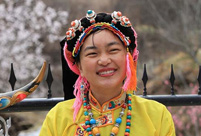 Jiaju Tibetan Village
Jiaju Tibetan Village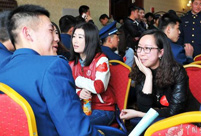 Spring dating
Spring dating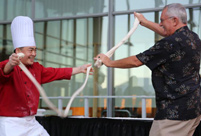 Confucius institute at UC Davis
Confucius institute at UC Davis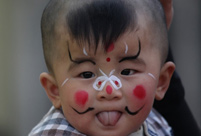 Little painted faces at temple fair
Little painted faces at temple fair Top 10 safest airlines in the world
Top 10 safest airlines in the world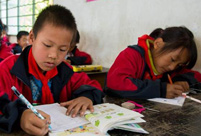 Foreign students at China-Myanmar border
Foreign students at China-Myanmar border The backstage of the Fashion Week
The backstage of the Fashion Week College students in Han costumes
College students in Han costumes Postgraduate works as waitress
Postgraduate works as waitress Life in a Lahu village in Yunnan
Life in a Lahu village in Yunnan An orphan’s wedding
An orphan’s wedding Hollywood documentary brings Diaoyu Islands truth to new audience
Hollywood documentary brings Diaoyu Islands truth to new audienceDay|Week|Month